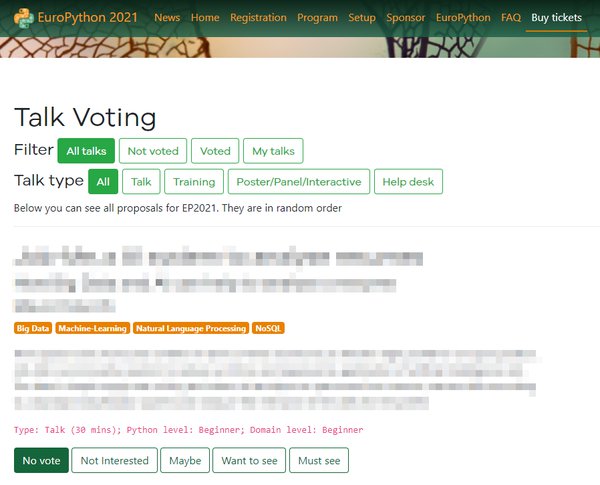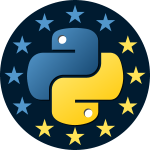Since you are the one who wants to attend the conference, we think you deserve a chance to tell us which talks you'd like to see most.
This is what talk voting is all about. If you think that's an interesting approach, please read on.
Talk voting will open once the CFP ends and remains open for one week.
Talk voting no longer open.
Who can participate?
To be eligible to vote for talks, you need to be a registered attendee of the current EuroPython main conference with a paid ticket, or had been an attendee of one of the previous EuroPython conference editions (going back to 2015). If you have submitted a proposal this year, you are also eligible to vote.
If you have not attended EuroPython before, but want to participate in talk voting, you can buy a ticket now and then proceed to the talk voting interface.
Please note that you have to be logged in to the website in order to see the talk voting interface.
How talk voting works
Please click on the above "Vote now!" button to start the talk voting interface. It lists all submitted proposals, including talks, trainings and posters.
Please note that your own submissions are not listed.

At the top of the page you find a few filters you can use to narrow down the list by e.g. selecting tags you're interested in or only show one type of proposal and also to select the sorting order.
For each submission, you can find the talk title with a link to the talk page.
In order to vote, have a look at the title/abstract and then indicate your personal interest in attending this session. You may choose between these four options:
- must see
- want to see
- maybe
- not interested
The talks you haven’t voted for are marked “No vote”.
Your votes are automatically saved to the backend without the need to click on a save or submit button.
Talk selection
After the talk voting phase, the EuroPython Program Workgroup (WG) will use the votes to select the talks and build a schedule.
The talk voting is a good and strong indicator of what attendees are interested to see. Submissions are selected by the Program Workgroup based on talk voting results and editorial criteria, for example, to increase diversity, give a chance to less mainstream topics as well as avoiding too much of the same topic.
In general, the Program WG will try to give as many speakers a chance to talk as possible. If speakers have submitted multiple talks, the one with the highest rating will most likely get selected.
Schedule announcement
We hope to have the selected talks announced early in May, with the schedule following shortly thereafter. As always, we will make these announcement on our usual news channels.
